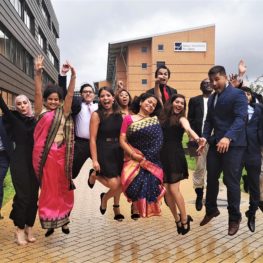Universität Flensburg
| Location | Situated on the German-Danish border at the end of a beautiful fjord, Flensburg, a city of seafarers and traders, is more than 700 years old. With its quaint alleyways and picturesque courtyards, Flensburg exudes a charm all its own – open to the world, but still on a human scale. A 10-minute bus ride takes you from the centre of the city to the campus. The new campus, which the university has shared with the Flensburg University of Applied Sciences since 2002, offers all the facilities that you can expect from a modern university, including student accommodation. The Energy and Environmental Management course is part of the International Institute of Management, which is located outside the campus, just a 5-minute walk from the city centre.
Founded in 1946, Flensburg University is a small, young university with approximately 4500 students. It is innovative and international, offering programmes in different fields of management and education. The compact campus and the size of the university allow students direct and easy personal contact to both lecturing and administration staff. |
| Course focus | Solving the problem of climate change and eradicating extreme poverty are the two big challenges of the 21st century. The energy sector is one of the key sectors that needs to achieve sustainable development and growth, within both developing and industrialised countries.
Sustainable energy systems for social and economic development are the focus of the 18-month Master Programme “Energy and Environmental Management in Developing Countries”. The course of studies leads to the degree of a “Master of Engineering in Energy and Environmental Management” (Industrial Engineering). This degree entitles its holder to the professional title of “Wirtschaftsingenieurin” or “Wirtschaftsingenieur”, which is legally protected in Germany. The programme qualifies professionals to work in key positions of the energy industry, governments, NGOs and international organisations. To take into account the different situations and the specific objectives of sustainable development in industrialised and in developing countries, the programme offers two branches of specialisation: “Energy and Environmental Management in Industrialised Countries” and “Energy and Environmental Management in Developing Countries”. Both specialisations offer a thorough training in energy and environ- mental economics, energy technology and energy management. Additionally, “Energy and Environmental Management in Developing Countries” puts special emphasis on improving access to modern energy services based on renewable energy, energy planning and project management. The specialisation is made up of two subject areas:
Business Economics, Energy Economics and Project Management The compulsory modules “Foundations of Sustainable Energy Systems”, “Environmental Economics” and “Sustainable Energy Innovation/Implementation in Developing Countries” deliver basic knowledge and understanding of the macroeconomic interrelation of environmental and energy-related problems. In addition, students have the following elective modules to choose from: “Trading Energy”, “External Costs of Energy”, “Shaping Sustainable Energy Systems” and “Energy and Environmental Policy”. Basic competencies in planning and steering development projects are taught in two further compulsory modules “Diversity Management in International Development Cooperation” and “Project Management (PME) in International Development Cooperation”. An optional module on “International Organisations and Development Strategies” allows students to specialise. Engineering – Renewable Energy and Energy Planning Students have to pass two compulsory modules on energy planning: “Sustainable Energy Planning in Rural Areas” and “Applied Informatics in Energy Planning”. All students have to select two further engineer- ing modules from among the three modules “Renewable Energy I” – “Hydro and Wind Energy” and “Renewable Energy II” – “Bio Energy and Solar Energy” and “Rational Use of Energy Auditing”. This allows students to specialise according to individual interests and the needs of their home countries. After successful completion of all modules, the students take part in an “International Class”, a five-week, project-oriented field research abroad. During the “International Class” students work in a multidisciplinary team on a development-oriented problem of sustainable energy use. This allows students to apply their knowledge in engineering, economics and social sciences and thereby deepen their methodological competencies in consultancy work and in planning sustainable energy systems. The last six months of the programme are assigned to the Master Thesis and the final oral exam, which is usually based on a field research on energy-related problems in a developing country. |
| Target group | Engineers and Industrial Engineers with work experience in the ener- gy sector |
| Course language | English |
| Entry requirements | B.Eng or equivalent university degree after a minimum of four years of studies.
|
| Degree Awarded | Master of Engineering (Industrial Engineering) in Energy and Environmental Management |
| Course Begins | April 2014 |
| Course Duration | 18 months |
| Duration of German language course prior to beginning of programme | German language course: 1 month Bridging course on economics: 2 months |
| Remarks | The application form must be accompanied by:
In addition to the official DAAD application form, candidates are required to submit a particular course application form which is available at www.iim.uni-flensburg.de/sesam |
Phone: +49 (0) 461 / 805-02
Fax: +49 (0) 461 / 805-2144



